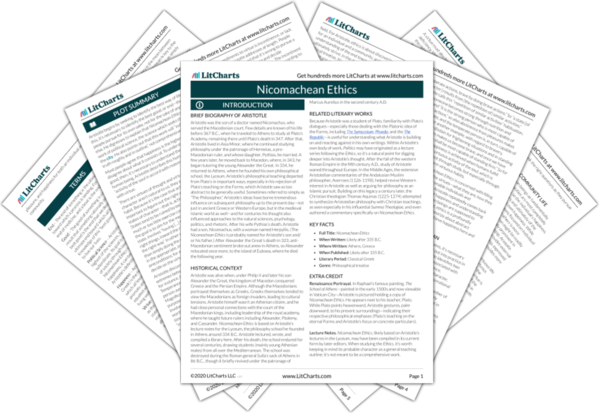Fine Quotes in Nicomachean Ethics
The remaining possibility, then, is some sort of life of action of the [part of the soul] that has reason. One [part] of it has reason as obeying reason; the other has it as itself having reason and thinking. Moreover, life is also spoken of in two ways [as capacity and as activity], and we must take [a human being's special function to be] life as activity, since this seems to be called life more fully. We have found, then, that the human function is activity of the soul in accord with reason or requiring reason. Now we say that the function of a [kind of thing]—of a harpist, for instance—is the same in kind as the function of an excellent individual of the kind—of an excellent harpist for instance. […] Moreover, we take the human function to be a certain kind of life, and take this life to be activity and actions of the soul that involve reason; hence the function of the excellent man is to do this well and finely.

Unlock explanations and citation info for this and every other Nicomachean Ethics quote.
Plus so much more...
Get LitCharts A+That is why it is also hard work to be excellent. For in each case it is hard work to find the intermediate; for instance, not everyone, but only one who knows, finds the midpoint in a circle. So also getting angry, or giving and spending money, is easy and everyone can do it; but doing it to the right person, in the right amount, at the right time, for the right end, and in the right way is no longer easy, nor can everyone do it. Hence doing these things well is rare, praiseworthy, and fine.
And so, if the same is true for bravery, the brave person will find death and wounds painful, and suffer them unwillingly, but he will endure them because that is fine or because failure is shameful. Indeed, the truer it is that he has every virtue and the happier he is, the more pain he will feel at the prospect of death. For this sort of person, more than anyone, finds it worthwhile to be alive, and knows he is being deprived of the greatest goods, and this is painful. But he is no less brave for all that; presumably, indeed, he is all the braver, because he chooses what is fine in war at the cost of all these goods. It is not true, then, in the case of every virtue that its active exercise is pleasant; it is pleasant only insofar as we attain the end.
Now some think it is nature that makes people good; some think it is habit; some that it is teaching. The [contribution] of nature clearly is not up to us, but results from some divine cause in those who have it, who are the truly fortunate ones. Arguments and teaching surely do not prevail on everyone, but the soul of the student needs to have been prepared by habits for enjoying and hating finely, like ground that is to nourish seed. For someone who lives in accord with his feelings would not even listen to an argument turning him away, or comprehend it [if he did listen]; and in that state how could he be persuaded to change? And in general feelings seem to yield to force, not to argument.












